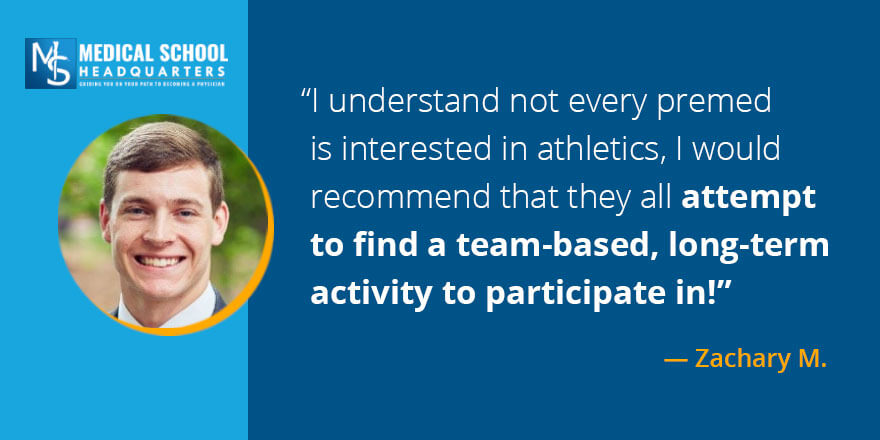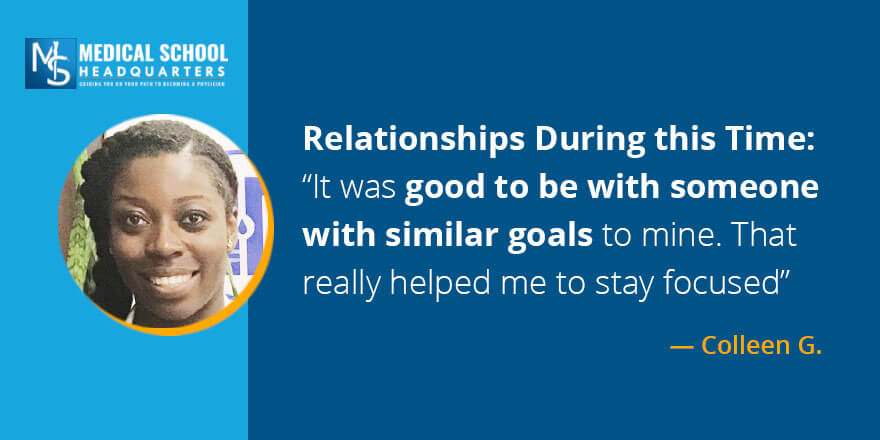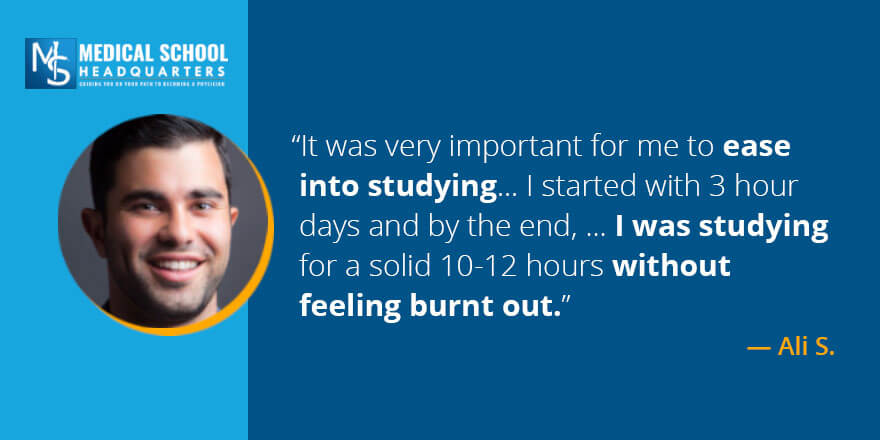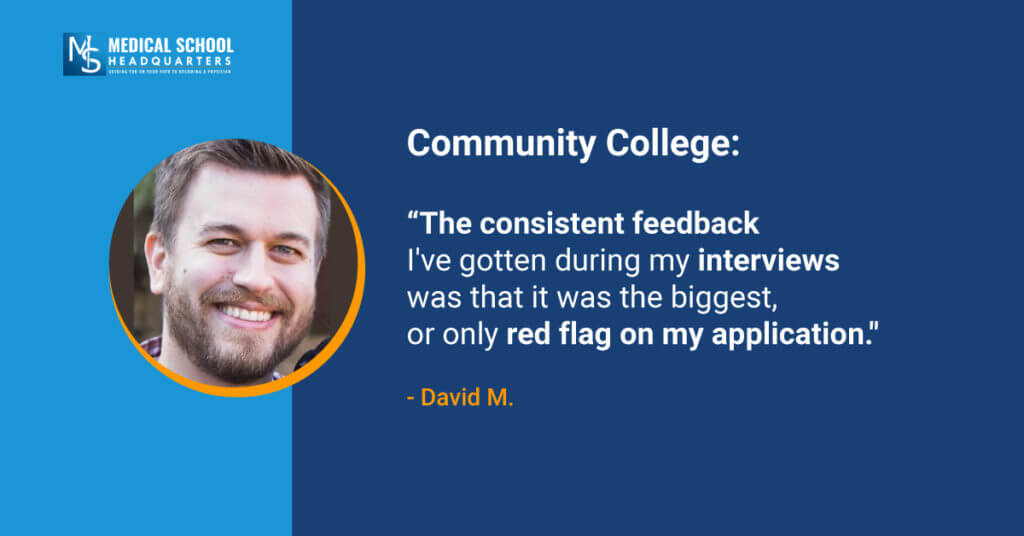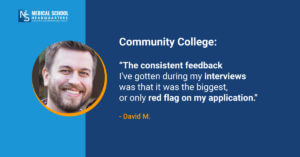
Who are you?
My name is David. I was born and raised in Arizona as the youngest of five kids. I went to Arizona State University for undergrad and have been working for the last seven years in the software industry.
What did you major in?
General Studies (yes, that’s a thing)
Why do you want to be a physician?
My older sister was diagnosed with stage-four colorectal cancer at the age of 25. Watching her treatment, end-of-life care, and death inspired me to serve others as a physician. I want to provide the same confidence-inspiring, compassionate care that was given to her and that has also been given to me in my life.
What was the most challenging part of being a premed student?
Definitely the loneliness and isolation. I chose to do my postbac coursework at a community college in order to accommodate my work schedule. The vast majority of the students were pursuing other careers. I can count on one hand the number of premeds that were in my classes. I had nobody to share the experience with, and it was incredibly lonely and discouraging.
Who did you lean on for support?
My wife is my rock. She has been completely supportive of my career change and even though she may not understand the intricacies of the premed or application process, she is always willing to help keep me motivated and focused on my goal.
It wasn’t until about halfway through my postbac that I found an online community (the Premed Hangout!) where I could meet and talk with other non-traditional students who were struggling with the same unique problems I was facing. Having that shared experience and understanding is so helpful.
If you had a mentor, how did you find him/her?
Didn’t have one.
What was the best general premed resource?
The Meded Media podcasts were the best for “high-yield” information, and especially for countering the neurotic fears I had. For more procedural, low-yield information, Reddit and SDN were really helpful (and not as negative as their reputations make them seem).
What was your relationship like with your school’s premed advisor (assuming you had one)?
Didn’t have one.
Ryan’s comments: David’s experience of going without a premed advisor is, unfortunately, not rare. It is very common for nontraditional premed students to not have access to premed advisors. That’s why I offer the services that I do.
What was your hardest class?
The first semester of physics. I had an instructor who completed his PhD in physics with a focus in relativism, so he guided the entire course in that direction. He tried to teach us in painstaking detail the intricacies of Einstein-ian relativity. It was just awful.
The only way I got through the class with an A was to stay after class ended and engage with him until I understood enough of what he was trying to say to get by.
What was your most impactful extracurricular?
I volunteered on the oncology floor of a hospital. Being around people at their lowest point in life was eye opening and humbling. I think everyone should have an experience where they are forced to confront the mortality of another human on an intimate level. These are people who are in great need, and in order to appreciate the weight of the responsibility ahead of you as a physician, I feel you need to see it first hand. Also, smelling c-diff.
I think everyone should have an experience where they are forced to confront the mortality of another human on an intimate level.Click To TweetWhat would you change?
I would have tried to do a formal postbac, or at the very least done my DIY postbac at a four-year university rather than community college. The consistent feedback I’ve gotten during my interviews was that taking my prereqs at a community college was the biggest or only red flag on my application.
[Related episode: Can I Take Community College Courses for My Postbac?]
How did you prepare for the MCAT?
I prepared for the MCAT for five months. My schedule was to study in the evenings on weekdays for three hours, and then six to eight hours on the weekends.
The biggest gains I saw in my performance happened when I abandoned traditional content review and instead focused on working through practice passages. Each passage was used as a guide for my content review. I would make sure I understood and could concisely explain why each answer choice on each question was right or wrong. This guided practice allowed me to review my weak points, as well as practice working through passages and digesting relevant information.
The biggest MCAT gains I saw happened when I abandoned traditional content review and focused on working through practice passages.Click To TweetI took ten full-length practice tests [use the promo code “MSHQ” to save 10% on Next Step Practice tests], three from Kaplan, four from Next Step, and three from the AAMC. The AAMC practice tests were the best by far, followed by Next Step. The Kaplan tests were basically written to test discrete knowledge and were not representative of the actual thing.
Roughly how much did you spend on MCAT prep?
$600
What were your top MCAT resources?
All the AAMC materials. The section banks are electronic gold: do them multiple times if possible. Next Step full-lengths were great. The Kaplan books were great, but mostly as a reference source. Khan Academy videos were great for brushing up on a topic. Khan Academy passages were hit/miss—I didn’t care for them.
What would you change about your MCAT prep?
I’d make sure I finished all my prereqs before taking the MCAT. I was missing all my biology and physics courses, so I spent the majority of my time trying to teach myself those subjects, instead of focusing on lower-yield things. I feel I could have scored 5-10 points higher if I had waited.
If I were doing it all over again, I'd make sure I finished all my medical school prereqs before taking the MCAT.Click To TweetHow did you prepare for your applications?
Listened to all the Premed Years episodes about how to write personal statements/essays. I bought application coaching services from Ryan, which was invaluable in crafting and telling my story through the personal statement and ECs. My early drafts were really rough, and I needed a lot of help polishing the rough edges.
Roughly how much money did you spend on applications and interviews?
$9,000 – 10,000
How did you choose what schools you applied to?
I wanted to maximize my chance of getting in, and ideally I wanted to have the ability to choose between a few options, so I decided to apply to a large number of programs (both MD and DO).
Using the MSAR, I made a list of schools where my GPA/MCAT were within or very close to the 10th to 90th percentile ranges. I also wanted schools that accepted a high number of out-of-state students, so I removed the majority of the out-of-state public schools from my list. Finally, I sat down with my wife, and we ranked the remaining schools based on location. From there, we chose the top 37 schools, and I had my list.
Why do you think you were a successful applicant?
I think my long work and life experience helped me stand out. My grades and MCAT were below average/average, so the other aspects of my application, including the way I was able to communicate my experiences in my application and in interviews was the difference maker.
I think my work and life experiences helped me stand out as a nontraditional student.Click To TweetHow did you prepare for your interviews?
I used Ryan’s book The Premed Playbook: Guide to the Medical School Interview, and did four mock interview sessions with him. I don’t like to talk about myself, so working through my struggles in the mock interviews was essential for me.
When interviews did roll around, I was able to walk in confident that I could perform well. I didn’t have any of the jitters or nervousness that my fellow interviewees had, and I’m confident it helped me stand out as a strong applicant.
Dr. Gray’s Notes
David is the perfect applicant to show that you don’t always know what schools are looking for. He applied to one school where he was quickly rejected. Another student I worked with was interviewed and accepted at that same school. Both were very similar. My theory is that the school didn’t like David’s community college classes and the fact that he didn’t quit his full-time job.
It’s impossible to know what medical schools are looking for, so you just need to do your best and hope that there will be a school that will take a chance on you!
Want to share your story?
If you’ve been accepted to medical school, or are a medical student, share your story with others to encourage, inform, and motivate them to continue down this path! Go here and fill out the form.
Links and Other Resources
- Check out my premed advising services here!
- Related episode: Can I Take Community College Courses for My Postbac?
- Related episode: Going from Community College, to Premed, to Medical Student!
- Need MCAT Prep? Save on tutoring, classes, and full-length practice tests by using promo code “MSHQ” at Blueprint MCAT (formerly Next Step Test Prep)!



